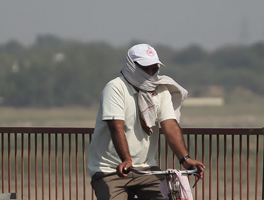 |
Dear readers,
Welcome to the Climate Weekly newsletter by the Centre for Science and Environment’s Climate Change programme and Down to Earth.
Last month witnessed one of the largest energy conferences, CERAweek, held in Houston, Texas. CSE’s Director-General, Sunita Narain, writes about how the week-long conference was a clear signal that our world has changed—and that the Trump administration’s energy policy is rejecting climate change as a focus in a rapidly warming planet.
She highlights the key reasons for this shift in policy. First, the country is focused on the need to “re-industrialise”, which requires more energy. Second, the US views the Artificial Intelligence (AI) race with China as critical, meaning more energy-intensive data centers. Currently, about 5000 data centers consume 3 per cent of the US’ grid-based electricity. This is expected to increase to 8-12 per cent by 2030. Over recent years, as the US reached peak growth levels, energy demand stagnated. However, with demand expected to increase again, the Trump administration will primarily focus on natural gas and nuclear power to boost their energy production.
With the US administration already fast-tracking the production of natural gas, it is highly likely that the country will increase its emissions—having already overused its share of the global carbon budget. Narain underscores the need to understand the ramifications of the US’ new brown-energy policy for countries like India or the continent of Africa, which need more energy for development.
In other news, a new study has revealed that global warming by more than 3°C in this century could wipe off 40 per cent of the world’s economy. The researchers behind the study looked to fix a fundamental flaw in the modelling of economic impacts of extreme weather, wherein the models assume a national economy is affected only by weather in that country. The new research incorporates the global repercussions of increasing extreme weather events, such as how floods or heatwaves in one country can affect the food supply in another. Further, the researchers include the impacts of weather shocks occurring simultaneously and more persistently across countries. Through such analysis, the predicted harm to global GDP becomes far worse than previously thought.
Lastly, Arctic Sea ice has reached its lowest-ever winter peak levels in 2025. This is the lowest recorded sea ice cover since satellite measurements began in 1979, and at 14.33 million square kilometres, is a staggering 1.32 million square kilometres below the 1981–2010 average. Watch this video by Down to Earth to find out more.
|
|
 |
| |
 |
|
| |
 |
 |
| |
By - Upamanyu Das
Climate Change, CSE
|
| |
|
 |
|
|
| |
 |
|
| |
| EXTREME WEATHER TRACKER |
| |
Expect 'double heatwave' in northwestern states this year as IMD shares weather outlook for summer season, 27 March 2025
|
 |
 |
|
|
| |
 |
|
| |
|
|
| |
|
|
| |
|
|
| |
 |
|
| |
CLIMATE NEWS | SCIENCE| IMPACTS| POLITICS |
|
| |
 |
|
| |
|
|
| |
 |
|
| |
|
|
| |
 |
|
| |
|
|
| |
 |
|
| |
|
|
| |
 |
|
| |
|
|
| |
 |
|
| |
|
|
| |
 |
|
| |
|
|
| |
|
|
| |
| Video |
|
Online Training Course |
| |
|
|
|
|
|
|
|
|
| |
|
|
|